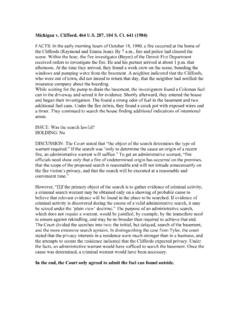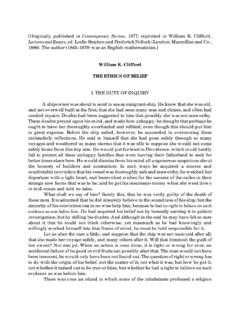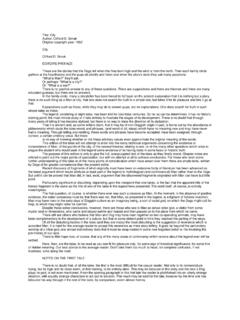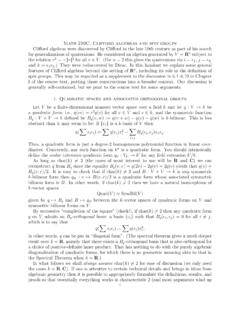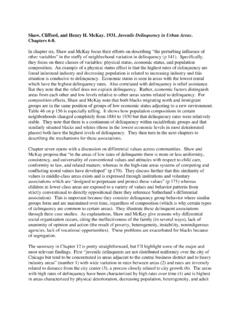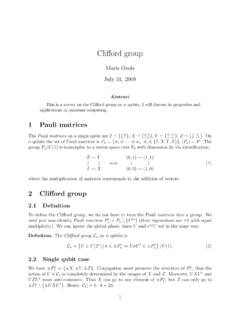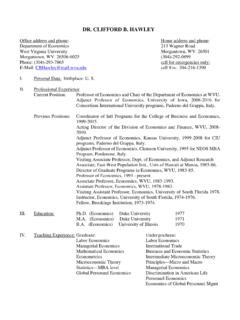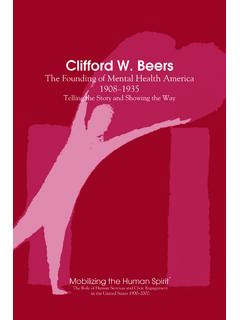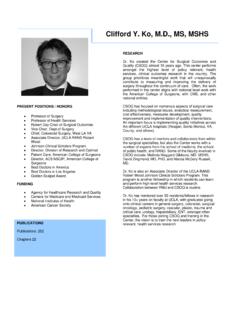Transcription of Culture as text: hazards and possibilities of Geertz’s ...
1 Culture as text : hazards and possibilitiesof geertz s literary/literacy metaphorKatherine E. Hoffman!Department of Anthropology, Northwestern University, Evanston, IL, USAThis paper considers the conceptual, ethnographic, ethical, and methodological implications ofGeertz s influential metaphors of Culture as text and of fieldwork as reading. In Morocco,one of geertz s two long-term field sites, large segments of the rural population, Berber-speaking even more than Arabic-speaking, are unschooled and nonliterate. Women s richexpressive Culture , including religious Culture , is oral. Drawing on long-term fieldwork amongTashelhit-speaking Berber women in southwestern Morocco, I consider the language ideologiesthat shape women s attitudes toward the production and dissemination of religious oral ideologies complicate the supposed transparency of geertz s literary/literacy paper reconsiders the possibilities of this metaphor for the anthropology of language, andlocates geertz s contribution and critical responses to it within the history of ideas and ethicsshaping ethnographic :language ideologies; religious language; oral Culture ; text.
2 Clifford GeertzAt the heart of the interpretive anthropology Clifford geertz pioneered, or at least popularised, isthe metaphor of Culture as text . He wrote in Deep play, his description of the Balinese cock-fight, that,The Culture of a people is an ensemble of texts , themselves ensembles, which the anthropologiststrains to read over the shoulders of those to whom they properly belong. ( geertz 1973a, p. 452)Moreover, in his article, Thick description, he commented on these texts :[W]hat we call our data are really our own constructions of other people s constructions of what theyand their compatriots are up ( geertz 1973b, p. 9)This metaphor has typically been considered a literary one, particularly in light of other parts ofGeertz s oeuvre where he emphasises the layers of interpretation or translation inherent to thepractice of ethnography (Keesing 1987, p.)
3 166), always intended to tack back and forthbetween emic (insider) and etic (outsider) perspectives. The use of metaphor and imagerywas central to geertz s vision of a revamped social science, and especially anthropology, thatwould take its cues as much from the humanities as the hard sciences. It is fair to say this!Email: 1362-9387 print/ISSN 1743-9345 online#2009 Taylor & FrancisDOI: Journal of North African StudiesVol. 14, Nos. 3/4, September/December 2009, 417 430was part of the literary move, but also methodologically it drew attention to the anthropologist stask of writing or encoding. As Mitchell has noted,[C]riticisms of geertz s work fault it for failing adequately to distinguish the natives cultural textfrom the interpretive text of the anthropologist (a difficulty geertz admitted himself from the begin-ning).
4 They do not tend to question what is meant by a text. (Mitchell 1990, p. 576 n 5)This is deeply problematic when one considers the work of anthropologists to be the renderingand sense-making of cultural and elsewhere, the Culture -as-text metaphor has been roundly embraced and critiqued. Itis not my intention to evaluate these assessments except insofar as they pertain to the argument Iwill elaborate regarding ideologies of text from the perspective of the Tashelhit Berber speak-ing women with whom I work in southwestern Morocco, many of them nonliterate. For thosepraising and critiquing geertz s insights, the humanistic component of his work becomes thefocal point, particularly his emphasis on multiple layers of interpretation involved in fieldworkand the production of ethnographic truth more broadly speaking, truth that by necessity canonly be partial, synchronic, and s attendant claim was that Culture is public and evident in human behaviour (influencedby Wittgenstein s belief of language as public): Culture is public because meaning is (Geertz1973b, p.)
5 12). Even belief, then, should be understood through the practices that it shapes andthus there is no need to get inside the heads of the Other (as if that were possible). This focus onculture as comprised of public systems of meaning was an important intervention at the time,when structuralists and ethnoscientists were insisting on the interiority of Culture and its groundingin the mind. Moreover, the notion of belief as manifest through behaviour is one I often heard whileconducting long-term fieldwork in southwestern Morocco in the late 1990s. My own field notes arefull of instances in which people explained others actions as revealing their desires, so that whatmattered was not what one wanted, but what one did (Hoffman 2002, 2008).
6 As I want to argue here, however, the metaphor of Culture as text is not only a literary meta-phor, but also a literacy metaphor. It seems to presume that we, whoever we are, share an orien-tation toward the practice of writing and the nature of texts . What is curious about geertz snotion of reading another people and Culture is its supposedly universal and accessiblemeans of explaining interpretation; presumably, we all read, and we know what readinginvolves. The levels of interpretation involved appear to be self-evident or at least familiar tothe anthropologist. When seen in this light, and considering the places and times in whichGeertz conducted his research, these presumptions constitute more of a starting point forinterrogation than a fait accompli.
7 It seems to me that scholars of the Maghreb must take intoaccount the orientations toward text held by the nonliterate people with whom many of uswork, and with them, to consider their understandings of the political economy of texts ,meaning their production, dissemination, and circulation, as well as the ways people interpret,authenticate, and grant texts these texts are written artifacts, the question of access is acute, as questions of powerimmediately arise, particularly because individuals access to literary practices is conditioned bywealth or poverty, geographical location (often a related concern), but also intrafamily relations as when parents and especially fathers choose which daughters to send to school, and for how s critique of geertz s notion of Culture as shared as well as public is particularly acute:I suggest that views of Culture as collective phenomena need to be qualified by a view of knowledgeas distributed and controlled that we need to ask who creates and defines cultural meanings, and towhat ends.
8 (Keesing 1987, p. 161) Hoffman418 Keesing contends here that symbolic anthropology, in order to make a lasting contribution, mustbe situated in a wider theory of society; cultural meanings need to be more clearly connected tothe humans whose lives they inform. Moreover, he convincingly contends, views of cultures ascollective symbols and meanings must be qualified with a sense of knowledge as distributed andcontrolled: Even in classless societies,who knows whatbecomes a serious issue (Keesing1987, p. 161).Written text artifacts, especially religious texts , can take on a fetish quality for those without themeans to decipher them, but such mystification is not limited to written texts . Literacy is a set ofpractices, as Street (1984) argues in his approach to cross-cultural studies of literacy; literacy isnot simply the possession of the skills of reading and writing, nor a transformed state of individualsand societies.
9 By considering literacy as a set of practices, we can ask what constitutes these prac-tices, who engages in them and how, and who determines which practices are worthwhile and whichtexts approached from this perspective, the operative concept of text is anykind of written artifact: a book, but also the numbers and street names on a bus, a receipt, a prescrip-tion insert (Wagner 1993). Looking at written text is one plausible, and highly fruitful, line ofinquiry into the meanings of text, reading, and writing in Morocco, where there is a marked distri-bution of literacy resources and differential access to any of these texts and literacy way to consider the issue of the authority of texts , however, is to abandon the pre-sumption that a text need be written.
10 Instead we can broaden the notion of text to one usedby folklorists and linguistic anthropologists, and that includes the spoken word. Urban (2001)has argued that all Culture is really metaculture in that it consists of instantiations of renditionsof convictions of what Culture involves that is, recognising the reproduction of Culture acrosstime and space and constantly shifting with each iteration. Such understandings presumablymove us away from the idea of text as static, with boundaries, and fixed, to be consulted inits entirety and considered as a whole, much as Ricoeur suggested and on which geertz s claim was that in writing we fix not the event of speaking, but the said of It is the meaning of the speech event, not the event as event (quoted in geertz 1973b,p.)
